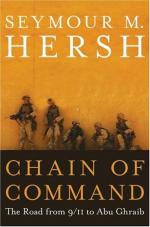|
This section contains 571 words (approx. 2 pages at 400 words per page) |

|
Chain of Command: The Road from 9/11 to Abu Ghraib Summary & Study Guide Description
Chain of Command: The Road from 9/11 to Abu Ghraib Summary & Study Guide includes comprehensive information and analysis to help you understand the book. This study guide contains the following sections:
This detailed literature summary also contains Topics for Discussion and a Free Quiz on Chain of Command: The Road from 9/11 to Abu Ghraib by Seymour Hersh.
Stories of prisoner abuse began to emerge from the U.S. prison in Guantanamo, Cuba, shortly after the war in Afghanistan. The new category of 'enemy combatant' made prisoners exempt from normal Geneva Convention rules. A new method of interrogation spread to Iraq and the prisons there. Much was made of the complete breakdown in command, which allowed such atrocities to occur.
In the aftermath of 9-11, President Bush authorized a Special Action Plan to allow enemy targets to be 'neutralized' anywhere in the world. This government-sanctioned assassination plan worried many, who thought the policy would be used against the U.S. in the future.
Pictures came to light at an Iraqi prison called Abu Ghraib, which documented prisoner abuse. Many attempts were made by the Bush Administration to downplay the abuse as isolated acts. Evidence showed that the prison operated in an atmosphere of minimal authority and no direction on formal interrogations.
In regard to 9-11, the F.B.I. seemed unable to analyze the vast amount of information it had to see that an attack was coming. The U.S. intelligence community had been on the decline since the fall of the Soviet Union. Even when one of the hijackers was captured prior to 9-11, he was not interrogated to find out what might be coming. After the fact, it was clear that there had been no incentive for him to work with the government and speak of what he knew.
The war in Afghanistan started out with many political arguments, and the power of the Taliban was greatly underestimated. Several units took major damage (although, for the most part, this was not reported by the media). Then the Taliban collapsed and the Afghan warlords took over.
Ahmad Chalabi was put forth as the dissident leader of the Iraqis. Even in his role as leader of the Iraqi National Congress, he was not supported by the Pentagon and the Intelligence Services. As the Administration pushed harder for war with Iraq, dissenting opinion was largely quashed. Some in the Administration had much to gain personally by starting an Iraqi war, including the Chairman of the Defense Policy Board, Richard Perle.
A report detailing an attempt by the Iraqis to obtain uranium from Niger for Iraq's nuclear program was hailed by the Administration as proof of Saddam's evil intentions, and another reason to go to war. Shortly after that, it was shown that the report was completely bogus, and it was questioned how such an obvious forgery made it to the President's desk. There were many arguments between the Pentagon, Administration, and the C.I.A. as to the way to proceed with war plans.
Donald Rumsfeld was directing war preparations. He circumvented typical military channels and severely underestimated the troops needed. Rumsfeld was also a large supporter of covert operations, including Special Operation hit squads. The covert war moved into Iraq, to work against the insurgents.
Another dubious ally in the war on terror was General Pervez Musharraf, the leader of Pakistan. The Administration praised his efforts, although the C.I.A. doubted his resolve. Pakistan was also implicated in efforts to sell their nuclear information to North Korea and Libya. The Administration refused to criticize Musharraf for this.
In the Iraq war aftermath, many regions are still very critical to the region's future. These include such nations as Saudi Arabia, Syria, Iran, Israel, and Turkey.
Read more from the Study Guide
|
This section contains 571 words (approx. 2 pages at 400 words per page) |

|



